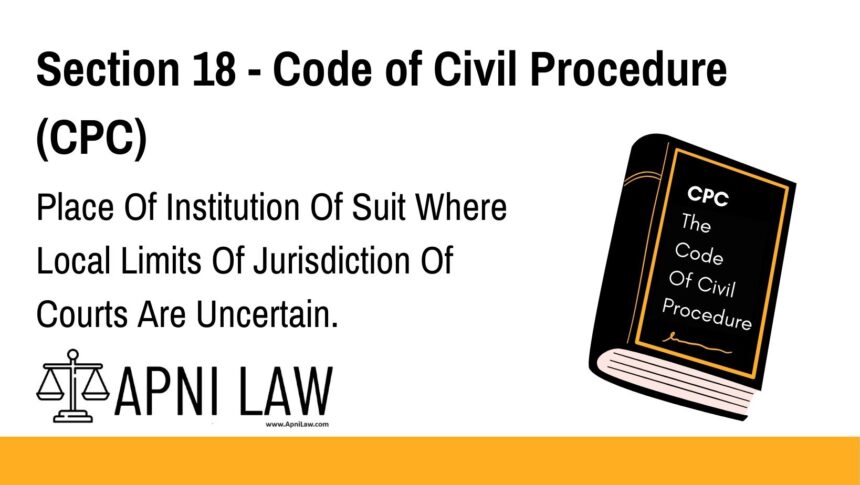Code
Section 18 of the Code of Civil Procedure, 1908 (CPC) states:
(1) Where it is alleged to be uncertain within the local limits of the jurisdiction of which of two or more Courts any immovable property is situate, any one of those Courts may, if satisfied that there is ground for the alleged uncertainty, record a statement to that effect and thereupon proceed to entertain and dispose of any suit relating to that property, and its decree in the suit shall have the same effect as if the property were situate within the local limits of its jurisdiction:
Provided that the suit is one with respect to which the Court is competent as regards the nature and value of the suit to exercise jurisdiction.
(2) Where a statement has not been recorded under sub-section (1), and an objection is taken before an Appellate or Revisional Court that a decree or order in a suit relating to such property was made by a Court not having jurisdiction where the property is situate, the Appellate or Revisional Court shall not allow the objection unless in its opinion there was, at the time of the institution of the suit, no reasonable ground for uncertainty as to the court having jurisdiction with respect thereto and there has been a consequent failure of justice.
Explanation
Section 18 CPC provides a practical remedy in cases where it is uncertain which court’s local jurisdiction an immovable property falls under. This situation often arises in boundary disputes or when the land is spread across indistinct jurisdictional borders.
- Sub-section (1): When there is uncertainty as to which of the multiple courts has jurisdiction over the property, and any one of these courts is satisfied that the uncertainty is genuine, it can record a statement to that effect and proceed with the case. The decree passed by such court will have the same legal effect as if the property were entirely within its jurisdiction.
- Proviso: The court must still be competent to try the suit with respect to its nature (type of dispute) and pecuniary value.
- Sub-section (2): If no such statement is recorded and someone objects during appeal or revision that the original court lacked territorial jurisdiction, the appellate or revisional court will not entertain the objection unless:
- There was clearly no reasonable ground for the uncertainty, and
- The error caused a failure of justice.
This section prevents delays and technical dismissals of suits due to minor territorial ambiguities when justice is not compromised.
Illustration
Let’s suppose a farmer owns a piece of land located near the boundary of District X and District Y. The land records and maps are ambiguous about whether the land lies entirely within District X or Y.
If the farmer files a suit in the District X Court for a boundary dispute, and the court is satisfied that the location is uncertain, it can record that fact and proceed with the case. The decree passed will be valid even if part of the land later turns out to be in District Y.
If the District X court does not record the uncertainty and a party challenges jurisdiction in the appellate court, the appeal court will assess whether the jurisdictional confusion was real and whether it impacted the delivery of justice.
Common Questions Asked in Exams
Q1: What is the main objective of Section 18 CPC?
Answer: To ensure suits involving immovable property are not dismissed on technical jurisdictional grounds when there is genuine uncertainty about which court has territorial jurisdiction.
Q2: Can a suit continue if the court is unsure about the location of the property?
Answer: Yes, as long as the court records the uncertainty under Section 18(1) and has jurisdiction in terms of subject matter and pecuniary value.
Q3: What if the court does not record such a statement of uncertainty?
Answer: The appellate or revisional court will not reverse the decision unless it finds there was no real uncertainty and a failure of justice occurred due to the jurisdictional error.
Q4: Is Section 18 applicable to movable or immovable property?
Answer: Only to immovable property.
Q5: How does Section 18 differ from Section 16 and Section 17 CPC?
Answer:
- Section 16 applies when property lies clearly within one jurisdiction.
- Section 17 applies when the property lies across multiple known jurisdictions.
- Section 18 applies when it’s unclear which jurisdiction the property falls under.








